Exploring E-Commerce Website Templates and Free Platforms
E-commerce has transformed the way businesses operate, opening up new avenues to reach customers across the globe. For new entrepreneurs and small businesses, creating an online store can seem daunting. However, thanks to the availability of e-commerce website templates and free platforms, it’s now easier than ever to build a professional and functional online store without needing extensive technical expertise. Let’s dive deeper into how these templates and platforms can be pivotal for your business’s growth.

What Are E-Commerce Website Templates?
E-commerce website templates are pre-designed website layouts that simplify the process of setting up an online store. These templates are built with the essential features needed for an e-commerce site, including:
- Product galleries for showcasing items
- Shopping carts for easy checkout
- Payment gateway integrations for secure transactions
- Mobile responsiveness for optimized mobile shopping experiences
By using these templates, businesses can avoid the complexities of web design and development, allowing them to launch their e-commerce websites with just a few customizations quickly.
Benefits of Using E-Commerce Website Templates
- Ease of Use: One of the biggest advantages of using e-commerce website templates is that they are designed with ease of use in mind. Most templates come with drag-and-drop builders or intuitive interfaces that enable users with no web development experience to create a store effortlessly.
- Time-Saving: Developing a custom website from scratch can be a time-consuming process. Templates help you set up your store in a fraction of the time, usually within a few hours, allowing you to focus on other aspects of your business.
- Cost-Effective: Starting an online business can be expensive, but e-commerce website templates are a budget-friendly option. Many platforms offer both free and paid templates, providing a range of options that fit different budgets.
- Customizability: Even though templates come pre-designed, they allow for a high degree of customization. You can easily modify colors, fonts, layouts, and images to make your store truly reflect your brand’s identity.
- Mobile-Responsive Design: With more consumers shopping from mobile devices, choosing a mobile-responsive template ensures that your store delivers an optimal shopping experience across smartphones and tablets.
- Pre-built Features: Most templates come with essential features like SEO tools, analytics, and customer support widgets, making it easy for you to manage your store effectively and efficiently.
Free Platforms for E-Commerce Website Templates
For those on a tight budget or just starting out, free platforms are an excellent option. Here are some popular choices offering e-commerce website templates:

- Shopify (Free Trial): Shopify is widely known for its ease of use and powerful features. While it’s a subscription-based service, Shopify offers a free trial period during which users can explore its extensive library of templates and start setting up their store.
- WooCommerce: WooCommerce, built on WordPress, is a free and open-source platform. It provides numerous e-commerce website templates and plugins, allowing users to fully customize and scale their stores. It’s a great choice for those looking for flexibility and control.
- Wix: Wix offers a range of free e-commerce website templates with its drag-and-drop builder. While the more advanced features require a premium plan, the free options are perfect for beginners looking to test the waters.
- Big Cartel: Ideal for small businesses and artists, Big Cartel offers free templates with a simple setup process. It’s great for those with a limited product range and a need for straightforward functionality.
- Square Online: Square Online allows users to create free online stores with integrated payment processing. Its templates are perfect for small businesses looking to sell products and services quickly and efficiently.
- OpenCart: OpenCart is an open-source e-commerce platform that offers free templates along with a range of extensions. It’s particularly beneficial for more tech-savvy users who want flexibility and scalability in their e-commerce sites.
How to Choose the Right E-Commerce Template
Selecting the right e-commerce website template is essential for your store’s success. Consider these factors when choosing your template:
- Industry-Specific Design: Many templates are tailored to specific industries, such as fashion, electronics, or food. Selecting a template that aligns with your niche helps convey the right message to your target audience.
- Customizability: Choose a template that allows easy customization to reflect your brand’s unique style and needs. You should be able to adjust fonts, colors, and layout to suit your preferences.
- User Experience: The design and functionality of your website play a significant role in user satisfaction. A well-organized, intuitive layout encourages visitors to navigate your site and make purchases more easily.
- Mobile Responsiveness: With mobile shopping on the rise, selecting a template that is mobile-optimized ensures that customers have a smooth experience, regardless of their device.
- SEO Optimization: Make sure your template includes built-in SEO features, such as meta tags, alt text for images, and easy customization for keywords. This will help your site rank better in search engines, driving more organic traffic to your store.
- Reviews and Ratings: Check the reviews and ratings of the templates you’re considering. Real-world feedback can help you gauge the reliability and effectiveness of a template.
Benefits of Using Free Platforms
Using free platforms for building your online store offers several key advantages:
- Low Cost: The most obvious benefit is that you don’t have to pay for the platform itself, making it a cost-effective way to get your business online without heavy financial commitments.
- Flexibility: Free platforms often provide a wide range of templates and customizable features, giving you flexibility in setting up your store exactly the way you want.
- Scalability: As your business grows, many free platforms allow you to upgrade to premium plans that offer more advanced features and greater storage capacity.
- Community Support: Platforms like WooCommerce and OpenCart have large, active communities that provide support, tutorials, and helpful tips for getting the most out of your website template and platform.
Tips for Maximizing E-Commerce Templates and Free Platforms
To truly make the most of your e-commerce website templates and free platforms, keep these tips in mind:
- Focus on Branding: Customizing your store to match your brand’s colors, logo, and personality will help it stand out in a crowded market.
- Optimize for SEO: Add relevant keywords, meta descriptions, and alt text to boost your site’s visibility in search engine results.
- Test Before Launch: Double-check that all features, including payment gateways, contact forms, and product galleries, are functioning properly before going live.
- Leverage Analytics: Use built-in analytics to monitor your website’s performance and make data-driven decisions on improving sales and user engagement.
- Keep Templates Updated: Regularly update your templates and plugins to maintain the performance, security, and functionality of your e-commerce website.
Conclusion
Thanks to the availability of e-commerce website templates and free platforms, launching an online store has never been easier. Whether you’re a startup or an established business, these tools provide the foundation for creating a professional, customizable, and cost-effective online store. By choosing the right template, optimizing for user experience, and focusing on branding, you can build a successful e-commerce website that drives traffic and sales. Take advantage of these resources today and start your journey toward e-commerce success!
